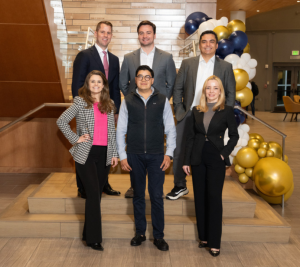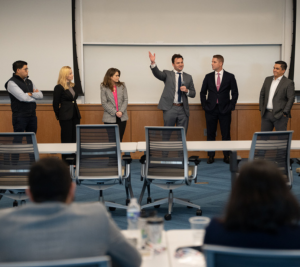By Will Wieters
For students in the Global Immersion Track of the Vanderbilt Executive MBA (EMBA) program, the International Capstone Strategy Project is a culminating experience, that merges academic theory with real-world business challenges. The EMBA capstone project is a key component of the program’s curriculum, providing students with the opportunity to apply their skills in an immersive, international business environment.
During the second year of the program, students join an international cohort—this year hosting 36 students—from the four prestigious business schools in the Americas Alliance, working within their diverse teams to develop strategic solutions for real businesses. This year, one team took on a particularly pressing issue—sustainability in the retail industry—by collaborating with Coppel, Mexico’s second-largest department store chain. The project aimed to address a growing textile waste challenge, ultimately providing actionable recommendations to support a circular economy.
The Challenge: A Growing Waste Dilemma

C-Team Participants (Front Row, L to R): Barb Pafetti, Jorge Ubilla, Aline Benjamin, (Back Row, L to R): Chad Gooyers, Clay Cauble, Gustavo Forjaz Antunes
As a major retailer in Mexico that sources rather than manufactures its diverse product line, Coppel identified a unique opportunity to take greater ownership of its environmental footprint. Recognizing the growing importance of sustainability, the company sought innovative perspectives to understand and better manage post-consumer textile waste, leading to a partnership with Vanderbilt’s EMBA program.
Shoes—composed of a material mix of leather, rubber, and textiles—represent a significant portion of Coppel’s waste stream. Such insight underscored the potential impact of targeted recycling strategies, with the company well-positioned to make meaningful strides in waste diversion and circular design.
The EMBA C-team assembled for this project, including Vanderbilt Business students Barb Pafetti and Clay Cauble, brought a diverse range of expertise. Members specializing in various areas, such as supply chain management, sustainability strategy, real estate development, and data analytics, allow the team to take a multifaceted approach to solving Coppel’s waste challenges.
“Right now, they’re trying to enact a lot of ESG [Environmental, Social and Governance] initiatives to figure out a way to be more circular and to reduce their waste,” said Pafetti. In an effort to deliver on those initiatives, Cauble pointed out that Coppel provided the team with a rich data set on product discards with their collaboration revealing an exciting opportunity to enhance waste tracking through material-level categorization—paving the way for smarter recycling and more informed decision-making.
A Two-Pronged Approach to Sustainability
Understanding the company’s desired end goal and the current gap in operations, the EMBA team designed a dual-phase strategy:
- Upstream Prevention: Reduce waste at the source by limiting purchases of non-recyclable and slow-moving inventory. “The best way to avoid waste is to not create it in the first place,” Pafetti emphasized.
- Downstream Solution: Implement a tracking system to categorize waste by material and seek partnerships with companies to repurpose and recycle those components.
“One of our biggest recommendations to the executive team was to start tracking waste types,” said Pafetti. “Some materials are recycled, while others aren’t, and understanding that distinction is crucial for implementing an effective solution.”
The team recommended a comprehensive waste tracking system that would categorize discarded materials by type—such as rubber, leather, and textiles—rather than treating those outputs as a single waste stream. “About 45-50% of their waste is shoes,” Cauble explained. “But we need to go further—how much rubber, how much leather, how much textile waste?”
Access to this granular data would enable Coppel to explore more sustainable partnerships with third-party recyclers. Knowing that there are companies that specialize in textile and rubber recovery, Pafetti suggested, “They [Coppel] need to identify those partners and start small by offloading waste streams that are easiest to recycle.”
These partnerships would align with a long-term goal of improving internal recycling efforts, leveraging existing circular economy models. Drawing from industry examples, “Nike has its Grind program, where it takes its rubber, grinds it into pellets, and uses it in new shoes or other product lines,” said Cauble.
He suggests that over time, Coppel could find similar ways to process some of their waste, promoting an opportunity for the retailer to lead sustainability efforts in the Mexican retail space.
EMBA Capstone Collaboration Across Borders
A unique aspect of the EMBA program is its global immersion track, enabling working students from across the Americas the opportunity to work together on cross-border business challenges. The Coppel EMBA capstone team was no exception with its C-team members from the U.S., Canada, Brazil, and Mexico challenged with collaborating across multiple time zones.
“We were all across the board,” said Cauble. “When we would meet at 8 PM Eastern, that meant 10 PM for Brazil and 5 PM for the Pacific crew. That’s why we divided and conquered.”
Pafetti, who served as the main liaison with Coppel’s leadership, emphasized the importance of direct engagement. “We talked to them [Coppel] once a month leading up to the capstone,” she said. Having that single point of contact streamlined communication.
Despite these logistical hurdles, the team found that in-person meetings during residency proved a significant difference. “We got so much more done when we were together than over weeks of Zoom calls,” said Cauble. “It showed us the real value of in-person collaboration.”
The team also benefited from the guidance of their capstone coach, a seasoned consultant who provided the strategic insights necessary for delivering a robust recommendation. Pafetti noted, “Our capstone coach was a consultant in real life, and so we had a lot of advantages in that aspect because of his professional experience and personality on how to handle specific situations.”
With that, the team’s supervisor Marco Caballero offered his own reflection: “As the capstone coach, I had the privilege of observing the team’s evolution as they navigated the complexities of a real-world business challenge. From the beginning, they adopted the methodology provided, including the use of strategic frameworks—not just as academic exercises, but as practical tools to guide their thinking. Their disciplined approach helped them stay focused, accurately frame the problem, and deliver evidence-based solutions aligned with the client’s sustainability goals.”
A Lasting Impact on Sustainability

By the end of the EMBA capstone project, the team’s insights had provided Coppel with a clear roadmap for managing its waste problem. The company expressed interest in implementing the proposed tracking system as a next step, with the potential for further sustainability initiatives down the line.
The project also left a lasting impression on the students involved. “For me, the most rewarding part was going to their headquarters in Mexico and presenting in their boardroom,” said Cauble. “That’s when it kind of hit that this was very much an international program and international project. We were lucky because not all teams got to do that and sit down with their respective, assigned companies.”
Pafetti reflected on a different key moment where the EMBA team uncovered that shoes—while representing 50% of Coppel’s waste volume—accounted for nearly 80% of disposal costs. This valuable insight opened the door for Coppel to prioritize high-impact sustainability investments with potential cost savings. “It wasn’t anything big, but I think it broadens the horizon for everyone to look at a problem from a different perspective,” she said.
Coppel’s openness to collaboration and continuous improvement reflects a long-term commitment to sustainability. By engaging with external partners and embracing data-driven strategy, the company positions itself as a leader in responsible retail within the Mexican market, and as Vanderbilt’s EMBA program continues to develop its students as leaders equipped for global business challenges, the team’s EMBA capstone project stands to show how strategic thinking and collaboration drive meaningful impact.
To learn more about the Vanderbilt Executive MBA program, click here.